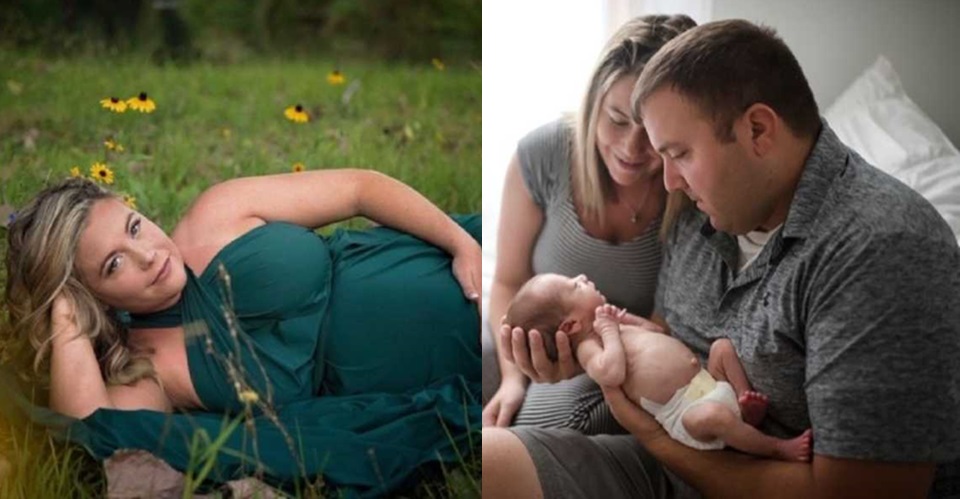For most expectant mothers, labor and delivery are filled with anticipation and fear. Kylee Harris felt that same mixture of joy and nerves. She imagined the soft cries of her newborn, the first skin-to-skin moment, the happy exhaustion after birth. But the story of her pregnancy would take a sharp, terrifying turn she never could have imagined.
Kylee’s pregnancy had been perfectly healthy. Each appointment ended with her doctor saying she was right on track. She had no swelling, no strange symptoms, just a growing belly and the excitement of a first-time mom. She was six weeks away from meeting her baby boy, soaking up every moment, often floating in her parents’ new pool to ease the summer heat and her aching back. Then, one ordinary August evening, everything changed.

After a long day in the sun, she climbed out of the pool and sat down to relax. A sudden wave of pain struck her head, a pounding so intense it blurred her vision. Her mother, an experienced OB nurse, grew concerned. When she took Kylee’s blood pressure, the reading made her heart drop. It was dangerously high, the kind of number that could send a woman into seizures. Panic filled the air, but Kylee didn’t want to believe it. She told herself she was fine, just tired, maybe overheated. Her mother insisted they leave immediately for the hospital. The car ride felt endless. Kylee’s thoughts bounced between denial and fear. She kept telling herself this was just a precaution, that they’d check her and send her home. But when the doctors saw her numbers, everything became serious. They began monitoring her closely, dimming the lights to prevent a seizure, running tests, whispering among themselves.
By the next morning, on her birthday, the doctor came in with grim news. Kylee had signs of preeclampsia, and her baby would have to be delivered early. Because her hospital couldn’t care for a 34-week preterm baby, she would be transferred by ambulance to a facility with a NICU. The reality of it all hit her at once. Her heart raced. She was not ready. Her hospital bag wasn’t packed. She wanted to cry, but the magnesium drip coursing through her body made her too weak to do more than lie still.

The ambulance ride to the larger hospital blurred together in flashes of light and sound. She chatted weakly with the EMTs, trying to stay calm, but soon felt the medication taking over, making her nauseous and heavy. When she arrived, her body felt foreign, slow, and unsteady. Nurses padded her bed in case she seized, and doctors moved swiftly to check both her and the baby. By the afternoon, her oxygen levels began to drop. Her baby’s heartbeat slowed. The monitor showed little movement. Panic rippled through the room. Her doctor entered with the words no mother wants to hear: she had developed HELLP Syndrome, a rare and life-threatening complication of pregnancy. Her liver was failing, her body filling with fluid, and her baby had to come out immediately.
The operating room was cold, bright, and dizzying. The magnesium made it hard for her to stay conscious. As the anesthesia spread, Kylee felt her breath slipping away. She tried to call for help but her voice was faint, her body too weak to fight. Through the haze, she locked eyes with her mother, who stood frozen with fear but forced herself to stay calm. The connection between them was silent but powerful, one last reassurance that she was not alone.

Moments later, her baby boy arrived, small but fighting. He weighed just four pounds and eight ounces, a tiny miracle pulled from chaos. Kylee was too weak to hold him. Hours passed before she finally saw his face in the NICU, surrounded by wires, tubes, and machines. The joy she expected after birth was replaced by exhaustion and disbelief. She had lived through her worst nightmare. The days that followed were long and painful. Kylee spent twenty days in the hospital, watching her baby learn to eat, breathe, and grow stronger. Each beep of the machines reminded her how fragile life could be. When they finally brought him home, free of wires and monitors, the world felt quiet again.

Months later, Kylee still looked back on that August with disbelief. Pregnancy had almost taken her life, but it had also revealed a strength she never knew she had. HELLP syndrome had forced her into survival mode, but it had not stolen her motherhood. She carries the scars of that night, physical and emotional, as proof that even the scariest beginnings can lead to beautiful stories of resilience.











